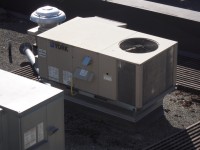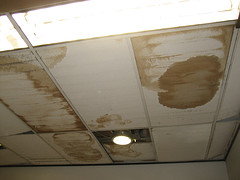Thursday, November 4th, 2010
Just a gentle reminder that a lot of companies close down at Christmas/New Year or work with minimum staffing levels. You can easily pay more than double for a call out during the festive season, so make sure you schedule all required electrical or HVAC work as soon as possible….or be prepared to leave it until next year!
Caledonia Integrated Services is an Energy Management, HVAC and Electrical company serving Vancouver and the BC area. Always putting customer needs first, we constantly look for ways for you to save energy and money.
Filed under: Electrical, Energy Management / HVAC, Heating, HVAC, Tip of the Month
Sunday, October 31st, 2010
 Sometimes the simple solutions are the best ones.
Sometimes the simple solutions are the best ones.
A small company were spending a fortune on heating and cooling, so they came to us for advice. As they had the older style mercury thermostats on their equipment, we advised that they update the equipment to programmable stats. All that was required for the changeover was some additional wire for the rooftop units so, after a little wire pulling, the new system was installed.
Well, they were stunned with the difference this simple solution made to their bills. The fans were not running all night, and the heating and cooling came on only when it was needed. And, with the savings they made on their energy bills, the new equipment was paid off in just a few short months.
Sometimes small alterations equal big savings!
Caledonia Integrated Services is an Energy Management, HVAC and Electrical company serving Vancouver and the BC area. Always putting customer needs first, we constantly look for ways for you to save energy and money.
Filed under: Energy Management, Energy Management / HVAC, HVAC, Thermostats
 Why is there water on my ceiling?
Why is there water on my ceiling?
HVAC technicians probably aren’t your first choice when this happens! Usually when someone sees water leaking from their ceiling they will call a roofer, assuming that rain is coming in somewhere (especially living in Vancouver!) or a plumber for a leaking pipe. It can be expensive to call out a professional, only to have him tell you that there’s nothing he can do and you need to call someone else. So, if you have an air conditioning unit here are some things to be aware of so that you can make an educated decision on who to call if this happens to you.
Think of your air conditioner like a glass of iced water, where water beads collect on the outside of the glass. In the same way, your air conditioner unit will pull water out of the air and cause it to condense. Over time, if the unit is not well maintained, the drain on the unit will plug with dirt, leaving the water with nowhere to go. It will overflow and cause a water leak.
So, make sure you have your machine regularly cleaned and checked to ensure this never happens to you.
***
Photo by: reditall
Filed under: Air Conditioning, HVAC
The warm weather is finally upon us so here are a couple of ideas to make sure your air conditioning is energy efficient…
-
Keep all doors and windows closed if you are running air conditioning. You don’t want to try to cool the entire city!
-
Don’t try to program your settings too low. If you put the temperature lower than around 68 °F the machine will ice up, stop working, and cost you HVAC call out fees.
-
Program your a/c to come on a couple of hours earlier, just for the warm spell. That way staff will be coming into cooler temperatures and are less likely to mess around with the thermostat (see above!)
-
Make sure your filters and coils are clean for optimum efficiency. All that cotton wood last month will play havoc with your equipment if you haven’t had it serviced.
Stay safe in the sun – and have a wonderful July.
Filed under: Air Conditioning, Energy Management / HVAC, HVAC, Tip of the Month
Can you smell gas?
A friend of mine gave me the shocking answer to this question the other day. There were some workmen in her apartment, completing a small 15 minute job. Although she could smell gas she assumed it was something they were doing and ignored it. After they left she could still smell it so she opened her balcony door and all the windows, and also switched on a fan. She then sat in the apartment (she works from home) for 4 hours until her husband came home and was met with a very strong smell of gas. The gas stove had been knocked slightly at some point during the morning and had been leaking gas for the rest of the day! And, here’s the thing, my friend had sat in it for so long that she could no longer smell it.
Luckily this story has a happy ending….they left the apartment as quickly as possible to air it, and took the opportunity to have a coffee date! However, things don’t always turn out so well so, if you DO smell gas take the following steps:
Leave as quickly as possible.
Do not use anything that could cause a spark ie a cell phone, light switch etc. Absolutely DO NOT SMOKE!
Once outside call the gas company.
Even if you have stopped the leak (stove burner on or similar) still get out of the building until it has had time to disperse.
Filed under: Energy Management / HVAC, Heating, HVAC, Tip of the Month
Well the sun has started to shine and the temperatures have started to rise….and now is the perfect time to think about getting your air conditioning installed or serviced.
When the weather starts to really heat up in July and August, HVAC guys are VERY popular and can hardly keep up with all the service work! Therefore your chances of getting anyone to come and work on a/c for you are slim! Get all the work done in May and June and you will be ahead of the crowds…and when summer rolls around you can sit back and watch everyone else scramble to try to find an HVAC company that’s not fully booked!
Well the sun has started to shine and the temperatures have started to rise….and now is the perfect time to think about getting your air conditioning installed or serviced.
When the weather starts to really heat up in July and August, HVAC guys are VERY popular and can hardly keep up with all the service work! Therefore your chances of getting anyone to come and work on a/c for you are slim! Get all the work done in May and June and you will be ahead of the crowds…and when summer rolls around you can sit back and watch everyone else scramble to try to find an HVAC company that’s not fully booked!
Filed under: Air Conditioning, Energy Management / HVAC, HVAC, Tip of the Month
What is a heat pump?
This is a question I get a lot! Most of us have been in this trade for so long that we take it for granted that everyone knows but let’s step back and try to answer the question…
The simplest answer is a heat pump is an air conditioner that can run backward. This means that in the winter the outside coil will get cold and the inside coil will give off heat, and vice versa in the summer. It is a very versatile and energy efficient piece of equipment that would benefit most homes and workplaces.
Filed under: Air Conditioning, Energy Management / HVAC, Heat Pump, HVAC, Tip of the Month
Monday, February 1st, 2010
Did you know….?
The Montreal Protocol is an international treaty to protect the earth’s ozone layer and phase out the production and importation of ozone depleting substances. As of January 1st 2010 the next phase out took effect, from now on, no new R-22 equipment can be manufactured or imported, and the annual allowable amount of HCFC’s is reduced by 75%.
What is R-22?
R-22 is a gas, which is the main refrigerant used in air conditioning equipment.
What does this mean to you? Does your equipment use R-22?
95% of the Air Conditioning equipment in use today is using R-22.
What can you do?
Maintain your equipment properly and professionally, use some of the many energy management ideas to cut down on run-time with, and reduce the load the best you can (i.e. keep windows and doors closed etc).
Filed under: Air Conditioning, Buildings / Area, City Buildings, Energy Management, Energy Management / HVAC, Facility Managers, General Contractors / Builders, Heat Pump, Heating, HVAC, I.T. Personal, Leasing / Renting, Malls, Office Managers, Recreation Centers, Schools / Universities / Colleges, Tip of the Month, Your Industry
Saturday, January 2nd, 2010
Happy New Year!
Time for some new ideas to go with your new resolutions! Try these ‘quick fixes’ to help reduce your energy costs…
Make sure all electrical equipment is switched off when not in use. Standby uses more power than you think.
Get your home or business properly insulated. Most of the heat in your home leaves via the roof, but any spaces under doors or small window cracks will lose a lot of heat.
For every 1°F a thermostat is turned down/up (summer/winter) equals 1% more energy usage. In winter, turn your thermostat down 2°F…you won’t notice such a small change in temperature but it will make a difference to your bills.
Wishing you all a peaceful and prosperous New Year.
Happy New Year!
Time for some new ideas to go with your new resolutions! Try these ‘quick fixes’ to help reduce your energy costs…
Make sure all electrical equipment is switched off when not in use. Standby uses more power than you think.
Get your home or business properly insulated. Most of the heat in your home leaves via the roof, but any spaces under doors or small window cracks will lose a lot of heat.
For every 1°F a thermostat is turned down/up (summer/winter) equals 1% more energy usage. In winter, turn your thermostat down 2°F…you won’t notice such a small change in temperature but it will make a difference to your bills.
Wishing you all a peaceful and prosperous New Year.
Filed under: Buildings / Area, Electrical, Energy Management, Energy Management / HVAC, Heating, HVAC, Tip of the Month
Saturday, October 3rd, 2009
Is a tripped breaker an electrical problem?
I recently got a call from a customer who had a problem with a breaker tripping on their new heat pump unit. The breaker was changed for a new larger one but the problem persisted.
It was time to discover what was happening – so I paid them a visit to see what was going on. I put the unit onto the cooling setting and the unit went into heating mode! The current climbed till the breaker tripped. Why was the heating coming on when it was 80°F in the room?
Well, I talked to the staff and found out that they had tried to adjust the schedule and somehow the settings got lost in the stat or it had been put back to factory setting (which would not work for a heat pump). I reprogrammed the stat and unit worked fine, but the customer had no cooling for a day (in the height of summer!) and it also cost them hundreds of dollars – all because their staff were not trained in using the stat!
Are today’s thermostats too complicated? Look at our energy management page for a simpler solution.
Filed under: Air Conditioning, City Buildings, Energy Management, Energy Management / HVAC, Heat Pump, HVAC, Tip of the Month


 Why is there water on my ceiling?
Why is there water on my ceiling?